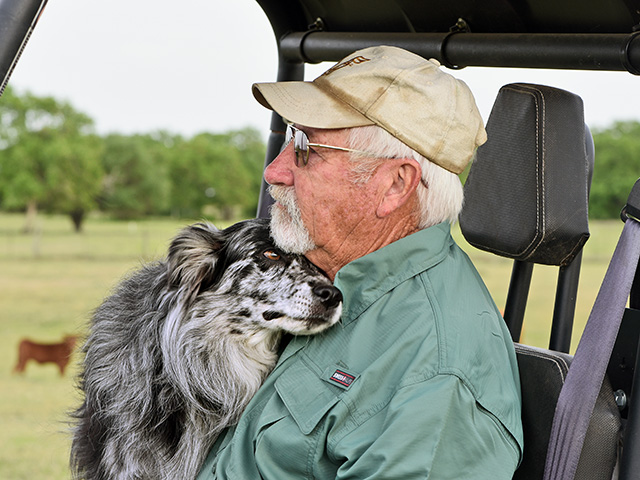Ask the Vet
Pets Help Ease Stress Around COVID
READER: There continues to be so much information and misinformation about COVID-19 that I am overwhelmed. I don't know what to believe. Are our pets and livestock at risk of getting the disease or passing it to us?
Dr. McMillan: As I write this, we believe the risk to animals is extremely low, and the risk of getting COVID-19 from animals is even lower. There have been sporadic documented cases in cats, ferrets, mink, tigers, lions and dogs. I know of no documented cases in livestock. Transmission of this disease appears to be largely from person to person, with aerosol transmission being the most efficient method.
Additionally, according to the FDA, "there is no evidence of human or animal food or food packaging being associated with the transmission of the coronavirus that causes COVID-19."
Pets and livestock should be treated like other family members. Minimize contact with people outside the household. If a person becomes sick with COVID-19, he or she should be isolated from both people and pets, and good sanitation should be implemented. There is certainly no reason to abandon pets out of fear. In the U.S., we are seeing a rise in cat and dog adoptions right now. Pets can help people better deal with stress, anxiety and depression. They always have and always will.
P[L1] D[0x0] M[300x250] OOP[F] ADUNIT[] T[]
This is a rapidly emerging disease. What we know and what we don't know changes every day. Not to make light of this, but I am reminded of what we were told our first day of veterinary school: "We have bad news and worse news. The bad news is half of what we teach you is wrong. The worse news is we don't know which half."
Science is always in a state of flux. The uncertainty and conflicting reports have always been out there. I firmly believe we will not only survive this pandemic, we will come out of it stronger and more united. I also believe people are looking at what matters most in their lives right now. From family to pets to gardening, we are seeing a reordering of priorities. The public has seen just how important American agriculture is. We feed the world. That's pretty awesome.
READER: We had a calf bloat last fall, shortly after weaning. We treated him like our veterinarian told us to -- mineral oil, antibiotics, frothy bloat drench, sodium bicarbonate and probiotics. He got better with treatment but bloated several more times over the next month. We thought he was finally well and put him back in the feedlot. He did fine for several weeks but bloated again. We have adjusted his diet, even tried an all-hay diet, but I am having to tube him every day. Our vet says he is a chronic bloater, and we should sell him.
Dr. McMillan: I agree that you have a chronic bloater. There are two types of bloat -- frothy bloat and free gas bloat. Frothy bloat is more common and usually occurs when cattle are on lush pastures. Certain legumes, including alfalfa and some clovers, increase the risk for this type of bloat. Free gas bloat occurs if there is a blockage or nerve damage in the esophagus that prevents eructation. Almost certainly, this calf has free gas bloat because of nerve damage.
I recommend getting a good cattle nutritionist to look at your feeding program and rations, and see if changes might be needed. Remember when mixing feed, there are at least three "rations." There's the one the nutritionist formulates, the one you think you are feeding and the one the cows eat. Measure and mix each component correctly. Overgrinding feed is a common mistake that reduces long-stem fiber and can lead to a plethora of digestive and performance issues, including bloat.
One particularly effective treatment for gastrointestinal upset is transfaunation. This involves transferring rumen contents including bacteria, protozoa and fungi from a healthy donor animal to the rumen of a sick animal.
As a last resort, a rumen fistula may control bloat until the calf can be processed. With this procedure, your veterinarian makes an incision in the left flank and into the rumen, and sutures the interior rumen wall to skin.
> Please contact your veterinarian with questions pertaining to the health of your herd. Every operation is unique, and the information in this column does not pertain to all situations. This is not intended as medical advice but is purely for informational purposes.
> Write Dr. Ken McMillan at Ask The Vet, 2204 Lakeshore Dr., Suite 415, Birmingham, AL 35209, or email vet@progressivefarmer.com.
[PF_0920]
(c) Copyright 2020 DTN, LLC. All rights reserved.




